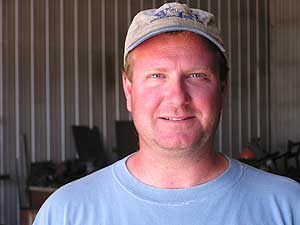|
Audio
Photos
|
August 3, 2005
 |
| David Hibma farms near Worthington. He'd like to buy farmland but says the price is too high. (MPR Photo/Mark Steil) |
Worthington, Minn. — MPR looked at almost 300 farm land sales since 2002 in Nobles, Jackson and Murray counties. The transactions included more than 33,000 acres, some 53 square miles of prime agricultural land. The sales records show sharp prices rises, especially in the past year.
Jim Larson is one of those buying land. The Murray County farmer says fierce competition for the available acres are pushing prices to historic highs.
"The price of land around here has been bringing $3,200 for the good land," says Larson. "The price has gotten up so high that I backed away from a farm this spring. It's beyond trying to make it work."
Larson farms about 3,000 acres. That's big by Minnesota standards. He's among an elite group of large producers in the state who receive most of the federal subsidies. The payments are handed out based on crop production. The more bushels you produce, the more money you get.
MPR looked at federal subsidies paid, and compared them with land sales. The research shows that a small group of farmers in the three counties accounted for one-third of the land purchases.
The group numbers about 65 people, 1.5 percent of all farmers receiving federal subsidies in Nobles, Murray and Jackson counties. Most lived in the counties, but some were buyers from other parts of the state expanding their holdings. Smaller farmers find it tough to compete.
David Hibma, who farms near Worthington and rents all his land, says competition has driven prices too high for him.
"It's always been kind of my dream to try to buy some land," says Hibma. "But I'm 33, and it's kind of hard for me to go out and bid against these guys that have a bunch of land paid for, and can afford to pay that much."
Some farm organizations have pushed for a cap on federal subsidies. They believe that would discourage expansion and cool off the land market. Opponents of the idea say it's wrong to blame federal subsidies entirely for the land boom. They say federal tax policies and the American tradition to get bigger also are important factors.
Bob Bergland knows what it's like to oversee federal farm policy. He was agriculture secretary under President Jimmy Carter in the 1970s. Bergland says current farm subsidies skew land sales.
"The payments and the support goes to raising crops. It does not go to conservation, it does not go to better husbandry, it just goes to more acres planted," says Bergland. "And that, of course, means that the benefit automatically flows to the larger farms. They just have a larger scale with which to operate. And so it works to their advantage."
Bergland says the federal government should reduce subsidies. Other nations are also pressuring the U.S. to cut back. They argue high subsidies allow farmers to sell their crops at a cheap price, hurting sales in poor countrys which can't afford subsidies for their farmers.
At Farmfest, U.S. Agriculture Secretary Mike Johanns will likely face a mostly friendly audience. Some farmers may be discouraged with land prices, but they also remember how federal subsidies helped them survive tough economic times.



